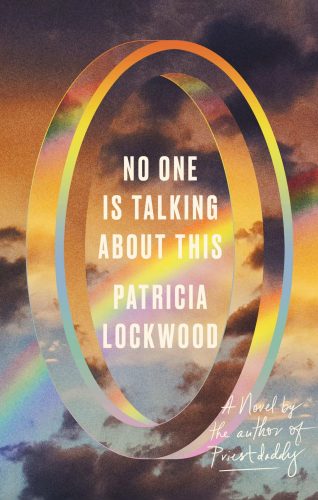Book Review: “No One is Talking about This” — Tale Of Two Realities
By Drew Hart
You will come away impressed by Patricia Lockwood’s skillful literary play — enjoy an escape from your own Internet miasma, and then be affected by a powerful contrast to it.
No One is Talking about This by Patricia Lockwood. Riverhead Books, 224 pp., $25.
Buy at Bookshop

Perhaps it’s time to pause and ask ourselves a potentially troubling question: just what is it that we’ve been doing in this past, pandemic-ridden year? Some may have little to report: not much change, no difference from before. However, for every person of that sort, it may be that there are three or four who would confess that they have spent longer, and possibly abnormal, amounts of time on the Internet (maybe while drinking!) Sequestered away, quarantined, housebound, it may have been the only outlet available for many to look into a larger domain. We may have reached a saturation level, having spent so many hours (months!) dwelling on its content. The world may be full of a number of things, but it’s not a certainty that this has made any of us happy as kings!
For those still open to considering what it’s all about, Patricia Lockwood — author of a previous, attention-getting non-fiction account of her upbringing in a pious Midwestern family with a fanatical father, Priestdaddy — intends to take you further. In her first (evidently also a bit autobiographical) work of fiction, No One Is Talking About This, Lockwood offers a kind of philippic that satirically addresses the grip exerted by online life. And, in a startling call-and response turn — the book is comprised of two parts — she then juxtaposes that world with one that is entirely grounded in traditional, natural existence, and… sadly, suffused with tragedy.
What the heck are we talking about here? No One… is at first barely about anything at all; its opening half is made up of scattershot references and glimpses of doings on “the Portal” (Lockwood’s term for the Web), as experienced and examined by a contemporary woman of the virtual moment. She’s a cyber community ‘influencer,’ with an urban (Brooklyn? It’s always Brooklyn lately) background, a furtive stand-in sort of a husband, and repressive childhood. She’s some type of Twitter-borne celebrity — she is known worldwide, dropping in everywhere making speaking appearances. How did she rocket to fame? By posting the question “Can a dog be twins?” to a popular site. (Really? Sure, why not?) Our unnamed narrator is seen in front of audiences from Dublin to Australia, encountering her devoted (and dependably eccentric) fan base — but there’s next to no plot line to be found. This is not a complaint: Lockwood has a virtuosic way of simply riffing on the nature of the beast, cutting in and out, offering observations on everything from sex toys to Radiohead to the riots in Charlottesville to… wait! there’s more! She’s firing staccato-burst paragraphs left and right, and they can be arresting. It’s a more eloquent display of random patter than what we usually find percolating on Twitter itself. In the background, there’s a nearly invisible baseline — occasional mentions of “the dictator,” who most certainly is Donald Trump — to keep us placed in time. Timing is, as always, everything; you wonder whether Trump’s defeat will shorten the shelf life of everything here? But quite possibly, impermanence is the larger point —
Until now, we’ve been discussing the opening half of No One… very little in it will prepare you for the latter part. Our narrator goes on tour in Austria, doing her usual ephemeral doings when, suddenly, there is a call from home: her mother lets her know that something has gone terribly wrong with the birth of a child her sister has had. She implores her to return and lend support. The story then becomes a very linear, though poetically poised, exploration of a family crisis — utterly opposed to the jumbled chaos shown earlier. It would be defeating to spell out what transpires; it’s only important to know that the juxtaposition serves to point out where life’s true importance may be found. And Lockwood isn’t thinking it’s on the Internet.
There’s an argument that the two halves of No One… might play more successfully alone, as shorter novels; there’s another that might insist that observations about the fleeting and trivial nature of life online have been overstated already, that things become redundant from time to time here. You will, nevertheless, come away impressed by Lockwood’s skillful literary play — enjoy an escape from your own Internet miasma, and then be affected by a powerful contrast to it.
Drew Hart writes from Santa Barbara, California
